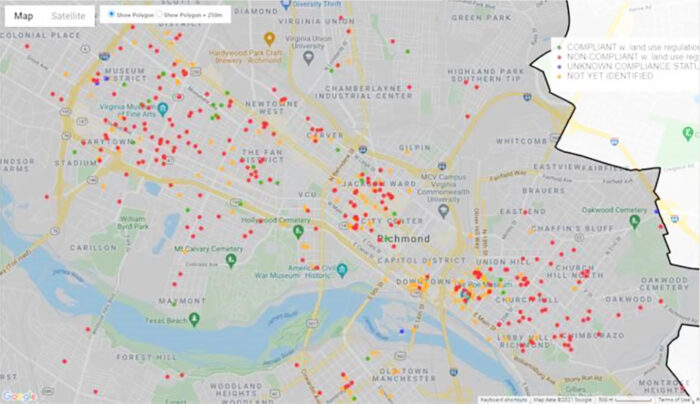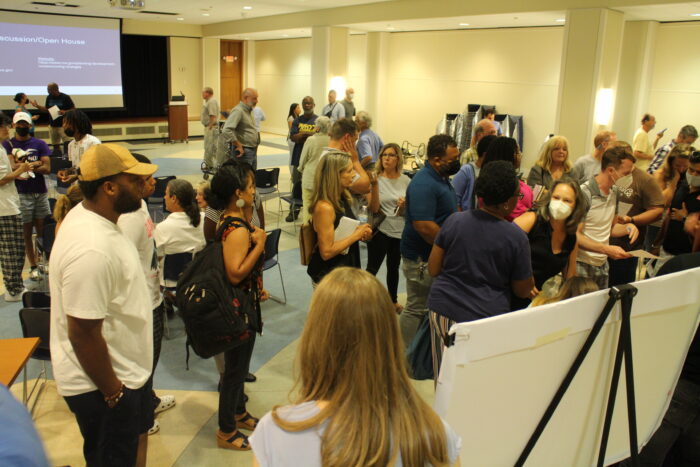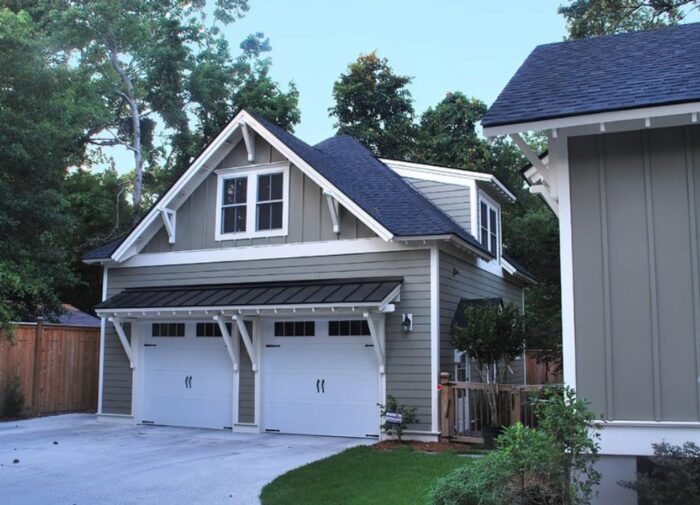
A map from January of identified STRs in the city show the greatest concentrations in the Fan and Museum districts, Jackson and Monroe wards, Church Hill and Shockoe.
As it prepares a major overhaul of all of its zoning rules, the City of Richmond is moving forward on a trio of proposed changes to regulations relating to short-term home rentals, accessory dwelling units and minimum parking requirements.
In a virtual meeting Tuesday, city planners presented their draft recommendations for changes to those specific regulations, based on research and community outreach and feedback that started with a series of meetings in August.

More than 700 people attended a series of initial meetings on the three zoning changes in August. (Jonathan Spiers photo)
For the Airbnb-style short-term home rentals, or STRs, the recommendations would eliminate a primary residency requirement in which operators must reside at the property being rented for at least half the year.
Instead, STRs would be permissible in any dwelling in any of the city’s zoning districts, but with a distance requirement separating the unit from another STR at a non-primary residence. The specific distance between units remains to be determined but planners said the distance would fluctuate according to lot sizes in a given district.
For multifamily dwellings with three or more units, only a third of the units could be permitted as STRs – or no more than 10 units, whichever is less.
Other existing regulations would remain the same, with STRs allowed as entire units or up to five individual rooms with no limit on the number of nights rented; no more than one booking transaction per unit during the same period; and a $300 permit required biennially.
The recommendations also call for more staffing for STR permitting and enforcement, adding a fine or penalty for noncompliance that increases with multiple violations, collection of transient occupancy tax on units, and requiring an inspection of the unit.
The primary residency requirement had been a point of contention for operators who rent out more than one property. In drafting the rules that are currently in place, officials had said the requirement was needed to prevent the possibility of operators buying up multiple properties in residential districts and using them as essentially mini-hotels.
For accessory dwelling units, or ADUs, staff recommends permitting one ADU by-right on the same property as a single-family dwelling in all zoning districts that allow such dwellings. Additional ADUs on the same property could be allowable but would require a special-use permit or other exception from the city.
Also referred to as accessory apartments, secondary suites or “granny flats,” ADUs could be internal or attached to the home, or detached; could not exceed one-third of the floor area of the dwelling, or 500 square feet, whichever is greater; and must comply with existing zoning regarding setbacks, lot coverage, height and other regulations.
Use of an ADU as an STR would require approvals for both. ADUs are viewed as allowing individuals to age in place, accommodating people with special needs, creating lower-priced housing and providing residents with rental opportunities to supplement income.
For parking space minimums, the recommendation is to eliminate that requirement from the zoning ordinance entirely, meaning property owners would no longer be required to provide a certain amount of off-street parking based on number of dwelling units or commercial floor area.
Planner Brian Mercer clarified that the change does not mean the city is no longer allowing parking; it’s just not dictating how many parking spaces would be needed on a particular property. That decision would be left to property owners and developers, who Mercer said have shown they’re willing to provide well beyond the required minimums to adequately serve their projects.
Eliminating the minimums, Mercer said, is meant to reflect current trends in parking use, simplify the regulatory process, support multimodal transportation, reduce costs on businesses and housing, and potentially encourage redevelopment of parking lots across the city.
The recommendations also call for continuing to expand transit and bicycle/pedestrian infrastructure, such as the GRTC Pulse rapid transit bus line and bike lanes in the city; promote shared parking, such as opening up office parking decks that could support evening users; revising residential on-street parking permit programs; and periodically assessing curbside time limits.
Years in the works, the zoning changes follow up on recommendations included in the city’s master plan and requests from City Council members. The STR changes fulfill a process started in January aimed at revising Richmond’s rules for regulating the Airbnb-style rentals, most of which the city considers noncompliant and illegal.
In January, the Planning Commission approved a resolution of intent to amend the rules and revisit certain regulations, including the primary residency requirement. The commission had been slated to consider amendments to the rules last summer, having adopted them in mid-2020 with the caveat that they would be revisited to review their effectiveness.
The recommendations open up a public comment period that’s scheduled to run until Jan. 2, 2023. A public comment form to provide feedback can be found on the city’s website. Additional meetings on the proposals are scheduled Thursday and next Tuesday and are also detailed on the site.
Staff expects to then draft individual ordinances for each of the proposed changes for presentation to the Planning Commission and City Council, which could adopt them by mid-2023. Planners said the changes are being pursued separately but could be lumped into the city’s planned zoning ordinance rewrite, if desired by city leaders.
The city is preparing to start a two-year process to rewrite the entire ordinance – an effort aimed to update zoning requirements to better reflect current development trends and goals. The process would start with creation of a citywide development pattern book and frameworks for a new zoning ordinance and zoning districts, followed by a drafting of the new ordinance in the second year.
The city is preparing a solicitation to request proposals from consultants, one or more of which could be selected to conduct the rewrite.

A map from January of identified STRs in the city show the greatest concentrations in the Fan and Museum districts, Jackson and Monroe wards, Church Hill and Shockoe.
As it prepares a major overhaul of all of its zoning rules, the City of Richmond is moving forward on a trio of proposed changes to regulations relating to short-term home rentals, accessory dwelling units and minimum parking requirements.
In a virtual meeting Tuesday, city planners presented their draft recommendations for changes to those specific regulations, based on research and community outreach and feedback that started with a series of meetings in August.

More than 700 people attended a series of initial meetings on the three zoning changes in August. (Jonathan Spiers photo)
For the Airbnb-style short-term home rentals, or STRs, the recommendations would eliminate a primary residency requirement in which operators must reside at the property being rented for at least half the year.
Instead, STRs would be permissible in any dwelling in any of the city’s zoning districts, but with a distance requirement separating the unit from another STR at a non-primary residence. The specific distance between units remains to be determined but planners said the distance would fluctuate according to lot sizes in a given district.
For multifamily dwellings with three or more units, only a third of the units could be permitted as STRs – or no more than 10 units, whichever is less.
Other existing regulations would remain the same, with STRs allowed as entire units or up to five individual rooms with no limit on the number of nights rented; no more than one booking transaction per unit during the same period; and a $300 permit required biennially.
The recommendations also call for more staffing for STR permitting and enforcement, adding a fine or penalty for noncompliance that increases with multiple violations, collection of transient occupancy tax on units, and requiring an inspection of the unit.
The primary residency requirement had been a point of contention for operators who rent out more than one property. In drafting the rules that are currently in place, officials had said the requirement was needed to prevent the possibility of operators buying up multiple properties in residential districts and using them as essentially mini-hotels.
For accessory dwelling units, or ADUs, staff recommends permitting one ADU by-right on the same property as a single-family dwelling in all zoning districts that allow such dwellings. Additional ADUs on the same property could be allowable but would require a special-use permit or other exception from the city.
Also referred to as accessory apartments, secondary suites or “granny flats,” ADUs could be internal or attached to the home, or detached; could not exceed one-third of the floor area of the dwelling, or 500 square feet, whichever is greater; and must comply with existing zoning regarding setbacks, lot coverage, height and other regulations.
Use of an ADU as an STR would require approvals for both. ADUs are viewed as allowing individuals to age in place, accommodating people with special needs, creating lower-priced housing and providing residents with rental opportunities to supplement income.
For parking space minimums, the recommendation is to eliminate that requirement from the zoning ordinance entirely, meaning property owners would no longer be required to provide a certain amount of off-street parking based on number of dwelling units or commercial floor area.
Planner Brian Mercer clarified that the change does not mean the city is no longer allowing parking; it’s just not dictating how many parking spaces would be needed on a particular property. That decision would be left to property owners and developers, who Mercer said have shown they’re willing to provide well beyond the required minimums to adequately serve their projects.
Eliminating the minimums, Mercer said, is meant to reflect current trends in parking use, simplify the regulatory process, support multimodal transportation, reduce costs on businesses and housing, and potentially encourage redevelopment of parking lots across the city.
The recommendations also call for continuing to expand transit and bicycle/pedestrian infrastructure, such as the GRTC Pulse rapid transit bus line and bike lanes in the city; promote shared parking, such as opening up office parking decks that could support evening users; revising residential on-street parking permit programs; and periodically assessing curbside time limits.
Years in the works, the zoning changes follow up on recommendations included in the city’s master plan and requests from City Council members. The STR changes fulfill a process started in January aimed at revising Richmond’s rules for regulating the Airbnb-style rentals, most of which the city considers noncompliant and illegal.
In January, the Planning Commission approved a resolution of intent to amend the rules and revisit certain regulations, including the primary residency requirement. The commission had been slated to consider amendments to the rules last summer, having adopted them in mid-2020 with the caveat that they would be revisited to review their effectiveness.
The recommendations open up a public comment period that’s scheduled to run until Jan. 2, 2023. A public comment form to provide feedback can be found on the city’s website. Additional meetings on the proposals are scheduled Thursday and next Tuesday and are also detailed on the site.
Staff expects to then draft individual ordinances for each of the proposed changes for presentation to the Planning Commission and City Council, which could adopt them by mid-2023. Planners said the changes are being pursued separately but could be lumped into the city’s planned zoning ordinance rewrite, if desired by city leaders.
The city is preparing to start a two-year process to rewrite the entire ordinance – an effort aimed to update zoning requirements to better reflect current development trends and goals. The process would start with creation of a citywide development pattern book and frameworks for a new zoning ordinance and zoning districts, followed by a drafting of the new ordinance in the second year.
The city is preparing a solicitation to request proposals from consultants, one or more of which could be selected to conduct the rewrite.




If two STRs are next to each other now, would one be forced to other use and if so which one?
Not to mention, how would you handle condos where living spaces are close together by design, versus distance for single family? They say ten units or 1/3 of the total, but does that mean they could be the same floor/row? Same owner? And how would prospective residential buyers know the composition around their potential investment? On the call they brainstormed putting a sign on the exterior of the building that indicates it’s an STR and the owner’s contact info in case of an emergency or code issue. How will the city ensure those are accurate? You practically have to beg… Read more »
A $300 permit to support compliance staff? It’s like having to get a permit to pay your taxes. Why not just use fines and occupancy taxes to support the staff? If there’s not enough income to cover enforcement costs, then maybe the “solution” is too big for the “problem.”
Great to see steps being made on ADUs and eliminating parking requirements. I am feeling proud of my city and optimistic for its future, hearing this.
All ADUs are limited to 500 sq ft? That seems really small. Isn’t a typical garage bigger than that?
Or 1/3 the floor area of the house, whichever is greater. So a 3,000 sf house could have a 1,000 sf ADU.
Not necessarily a zoning question, but a consequential question regarding ADU’s. How will water and sewer hookup work for ADU’s? Tap off existing primary structure or have to provide a new connection all the way to the street? Seen both scenarios in other localities where ADU’s are allowed. Also, how will the fees work? 600 sf minimum for ADU’s seems to be more the norm.
The problem with STRs is two fold. They remove units from the overall inventory which drives prices up, and they run the risk of becoming “party houses”. I would be more in favor or a tiered approach to STRs. For instance, in certain districts the primary residence would be required as it is now and in other areas such as multi-family residential it could be optional like they are suggesting.
There’s a racial undertone, perhaps overtone, to your comments. It doesn’t take a deep knowledge of planning history to know why public transit routes were put where they are or the multifamily zoning is restricted to certain areas. If we are to allow STRs more broadly, then let the market decide. The neighbors in Windsor Farms (or any neighborhood that benefited from redlining) should not have a different standard than anyone else.
Not intended to be racial at all and has absolutely nothing to do with transit, which is why I put my opinion about parking and transit in a separate comment. Was more thinking single-family versus multi-family no matter where it is located. Whether in a relined area or not. Essentially my thinking is people who buy single-family homes (no matter where) buy it because they are not surrounded by rentals, especially rentals that essentially act like hotels. Whereas, when you go into a multi-family environment it is more likely to have more rentals. Nothing about my comment was intended to… Read more »
Thanks for the reply, and I understand your point. It’s an interesting debate to have over which areas would be acceptable for STRs and which would not, and what the rationale would be. People can downvote me all they want, but if you start talking about inequity in policy because “it’s always been this way” then you’re perpetuating the problem. Our zoning is too complex currently to really hash out what the intent is in building or buying in a particular area, or what that area’s best opportunities are for growth. I know of an Airbnb a block away from… Read more »
I would not have a problem removing requirements if they would put some sort of distance from a transit stop requirement. It is ok to do that near transit, but in other areas it could become an issue.